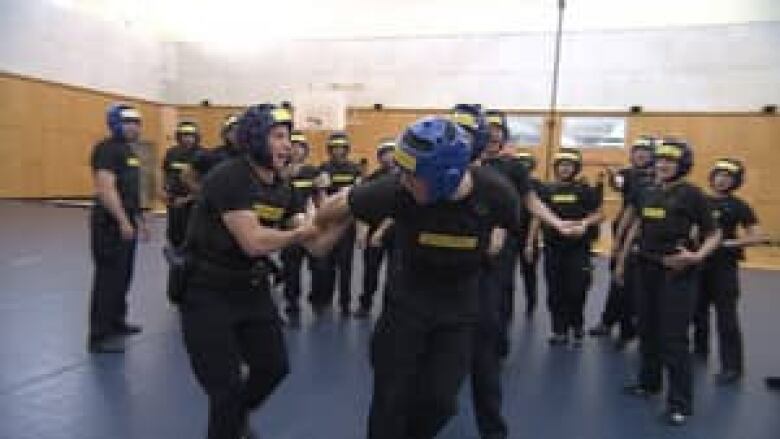Police rookies simulate use-of-force scenarios
In every scenario the instructor asks: "Who's in control?" The answer: "We are."
One of the ways Vancouver Police Departmentrecruits learn use-of-force rules is through simulations at the Justice Institute of B.C.
The police force has come under scrutiny this past week aftera video showing a plainclothes Vancouver police officer punchinga detained man in the face was postedon Facebook.
On Tuesday, the B.C. Police Complaint Commissioner announced theWest Vancouver Police Department would investigate the punch, andwhether it was an inappropriate conduct in the situation.
In the video, the detained man asks why he was hit, andis told it is because he was resisting. When you rewind the video, you can see how the detained man does raise his arm as he turns his head.
'Obviously, you want to gain the person's voluntary compliance, but that may not always be possible.' Brad Fawcett, Justice Institute of B.C. instructor
Brad Fawcett, a use-of-forceinstructor at the Justice Institute, teaches the rookies that resistance isn't always aclear-cut issue, but when it happens, it usually happens at first contact, which is usually whena suspect is being handcuffed.
Fawcett says maintaining control is one of the core tenets ofpolice work: Control of themselves, control of a situation, and control of a subject.
"Obviously, you want to gain the person's voluntary compliance, and that may not always be possible," Fawcett said.
When asked "is there ever a time when officers are allowed to hit or punch?" he says: "Oh, certainly. Certainly."
"Again, it's all dictated by the nature of resistance that the person demonstrates," Fawcett said.

Fawcett leads the officers-in-training in apretend barroom arrest. Someone pretends torecord the event on a cameraand yells "this is going on YouTube."
Fawcett says simulating, then debriefing events that will be encountered in the real world is a large part of training.
With every scenario,another instructorasks the same question: "Who's in control?"
The correct response, the only response,is: "We are."
With files from the CBC's Deborah Goble













_(720p).jpg)


 OFFICIAL HD MUSIC VIDEO.jpg)
.jpg)



























































































